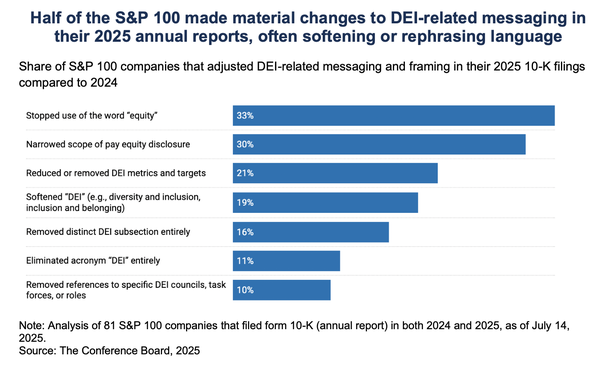
Nine months after corporate America
began pulling back from DEI, new research suggests the aftermath is complicated. Efforts to promote diversity, equity and inclusion aren’t dead. But they’ve certainly gone dark.
A
recent Conference Board report finds that more than half of the S&P 100 have softened or stripped DEI language from their filings so far this year. Tech firms led the retreat, with 78% toning down
diversity references. One-third dropped the word equity altogether. Public disclosures of workforce and board diversity have also plunged: The share of companies reporting female board
representation fell by 30 points, and more than half of Russell 3000 firms now say nothing about racial or ethnic makeup.
It’s a sharp reversal from just a few years ago, when DEI
transparency was treated as a badge of good governance. Now, under legal and political pressure, companies are rebranding DEI as “culture,” “inclusion,” or
“belonging,” hoping that blander phrasing will soothe both conservative “antiwoke” investors and internal and external diversity advocates.
advertisement
advertisement
Meanwhile, board
oversight of DEI has quietly grown, suggesting that what used to be seen as purpose work—the belief that inclusion strengthened the brand—has become compliance work aimed at avoiding
lawsuits.
The Conference Board notes that companies are embedding DEI into governance structures even as they make it less visible externally, which can look like backsliding into an era when
companies cared less about workforce development. “The decision not to disclose certain metrics, while it aligns with current compliance expectations, may carry longer-term costs by weakening
stakeholder trust, including current and potential employees,” the report says. It can also complicate engagement with institutional investors and global regulators, who may want to see more
explicit details about the company’s workforce.
An obvious casualty has been the DEI workforce, with NPR reporting that since early 2023, U.S. employers have eliminated more than 2,600
jobs with words including "diversity" or "DEI" in the titles or descriptions.
For marketers, the risk is less clear. Silence may feel safer, but it reads as backpedaling. When a brand that
once celebrated inclusion suddenly goes quiet, audiences notice—and they remember.
A recent Catalyst report reinforces those warnings. More than three-quarters of employees (76%) say
they’re more likely to stay with an employer that supports DEI, while 43% say they’d leave if their company scaled back. On the consumer side, 69% said they’re more likely to buy
from a company that supports DEI—and 36% said they’d boycott those that don’t. So while a retreat may reduce legal exposure, it also increases talent and brand risk.
A
Stanford Graduate School of Business analysis of DEI controversies from 2008–2022 found that companies relying on symbolic gestures—public statements without structural change, which it
dubbed “DEIwashing”—underperformed peers by roughly 3.5% annually. Those companies also saw higher turnover among women and people of color. Even in a friendlier era, cosmetic DEI
carried real costs.
And a Harvard Business School/HRCI survey adds one more irony, with 96% of HR professionals saying that they still believe diversity improves performance, despite the
hushed corporate effort.
The bottom line: Silence about diversity efforts isn’t neutral. As DEI visibility dims, so does trust.